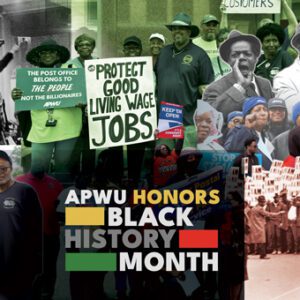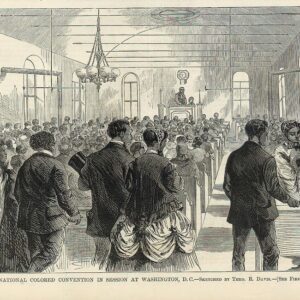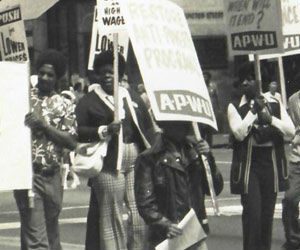February 28, 2017
The Great 1970 Mail Strike that Stunned the Country
(This article first appeared in the March-April 2017 issue of The American Postal Worker magazine.)
In March of 1970, the United States had been in a financial and commerce standstill for two weeks. Tired of poor working conditions and low pay, postal employees went on strike at 499 post offices in 13 states. Mail piled up and went undelivered while the eyes of the nation were focused on the strikers. Time magazine wrote that it was “the strike that stunned the country.” 
“Being a union member, I told [everyone] it was my duty to join [the strike],” recalled APWU Northeast Region Retiree Convention Delegate and striker Dolores Young. “I said, ‘well if this means there’s going to be improvements and changes, I have to get involved.’ ”
‘We Were Hungry’
Postal workers did not go on strike lightly. The pay for the average worker was extremely low and working conditions were dismal. “When I first made regular, my salary was $145,” said Young. That was “for two weeks, working 80 hours.”
“We were hungry,” added now-retired APWU clerk Eleanor Bailey. Many workers qualified for food stamps and other government assistance. Workers had no ability to negotiate for wages and Cost of Living Adjustment (COLA) increases.
At the time, career employees did not know how many hours they would work. Workers would wait in the breakroom, or “swing room,” off-the-clock for mail to arrive. It could take 11-12 hours to work a full eight-hour shift. “My father was a postal worker, and he sat around for possibly only two hours of work,” said Bailey. “He had to wait and be called.”
On March 12, 1970, Congress gave itself a whopping 41 percent pay hike and offered postal workers only a 5.4 percent raise. Outrage spread in postal facilities across the country.
Strike!
Irate letter carriers of New York City’s Branch 36 voted to strike on March 18. Members of the Manhattan-Bronx Postal Union (MBPU) refused to cross the picket line, and voted to join the strike on March 21. Many others followed and by the end of the strike, over 200,000 workers had walked off their jobs.
“You got to have a goal,” said Bailey. “Our goal was for a better salary and a lot of changes in the workplace.”
In an effort to break the strike, U.S. President Richard Nixon sent more than 23,000 military personnel to New York City postal facilities with orders to transport, sort and deliver the mail. “We have the means to deliver the mail,” he claimed. The President’s words were false, as the strikebreakers could not perform the tasks without training. Negotiations between the Post Office Department and the postal unions started on March 25.
The strike drove Congress to enact the Postal Reorganization Act of 1970. Postal unions won the right to negotiate with management over wages, benefits and working conditions. It also established the U.S. Postal Service as an independent agency, funded by postage sales and services.
‘Stick with the Union’
The following year, on July 1, 1971, five of the eight postal unions merged together to form the American Postal Workers Union. The members of the United Federation of Postal Clerks, the National Postal Union, the National Association of Post Office and General Service Maintenance Employees, the National Federation of Motor Vehicle Employees and the National Association of Special Delivery Messengers were now all APWU sisters and brothers.
Shortly after its founding, the APWU negotiated a contract with a significant pay increase, faster step increases, a COLA and ended the practice of waiting off-the-clock in a swing room. United together, the new union has continued to bargain collectively to achieve secure, safe and good paying jobs across the different crafts.
The improvements to postal workers’ salary and conditions “happened because of the union,” said Bailey. She urged today’s APWU members to recruit co-workers to “join the union, because it makes us so much more powerful.”
“Stick with the union,” added Young. “That’s the number one thing!”



